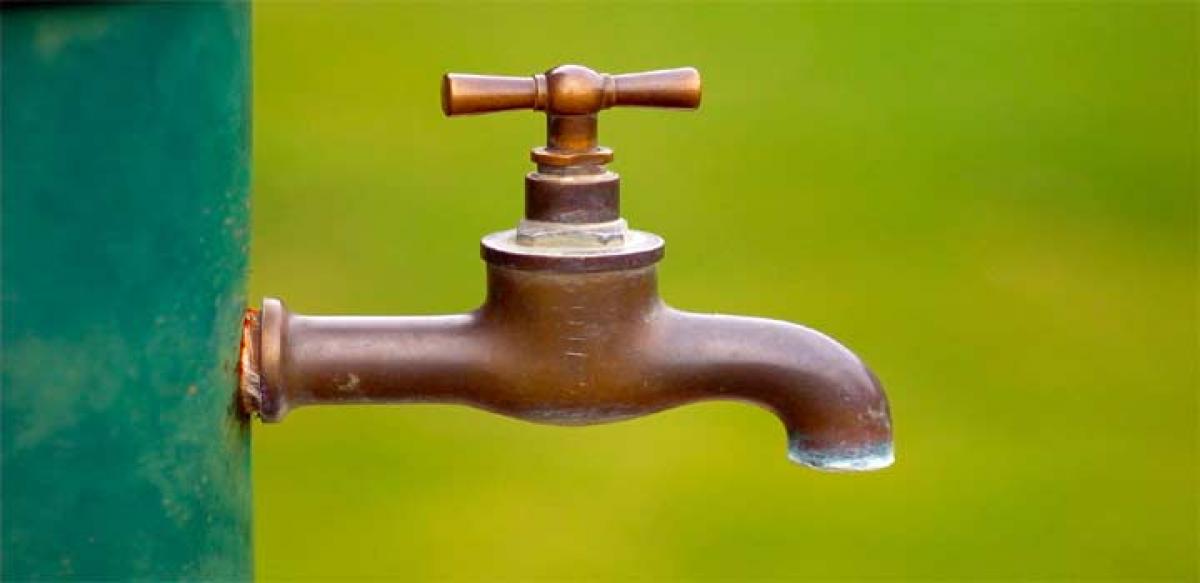Live
- South Korea's ruling party leader cancels press conference amid calls for resignation
- AIADMK's big meet discusses 2026 polls, prospective alliances
- BJP questions Congress-Shiv Sena (UBT) alliance over Aaditya Thackeray's Savarkar-Nehru remark
- Maha Oppn to boycott customary CM tea meet, cites rising farmers' distress, atrocities against Dalits
- Mikheil Kavelashvili is new Georgian President
- He makes things look easy: Smith on 241-run partnership with Head
- Decline in TB cases & deaths in India ‘remarkable’, shows ‘political commitment’, says former WHO Director
- PKL 11: Delhi dedicates win over Haryana to ‘junior express’
- Cyclone kills 14 in French territory Mayotte
- 3rd Test: Head, Smith centuries flatten India on Day 2
Just In

New water idea may spur protests. The Centre is mulling a proposal that would undermine the role of municipalities and other civic agencies in urban water supply.
.jpg) Initially, 600 cities will be serviced by private parties
Initially, 600 cities will be serviced by private parties
New Delhi: The Centre is mulling a proposal that would undermine the role of municipalities and other civic agencies in urban water supply. According to this policy, private agencies will supply drinking water to about 600 cities, including 100 smart cities in the country, according to sources.
In fact, the earlier NDA government itself considered a similar proposal at the later part of its tenure. The National Water Policy of 2002 called for public private partnership (PPP) in the water sector. The UPA government that came to power later also did not give up the idea altogether.
The Jawahar Lal Nehru National Urban Renewal Mission (JNNURM) also mooted public private partnership in this vital sector. The policy was in fact tried in Nagpur and Mysore. Despite not so encouraging experience, the NDA government is reviving the policy.
The Union Urban Development Ministry is preparing a model concession agreement that would serve as the framework for public-private participation (PPP) in the sector. The Central Government is expected to finalise the model in next a few months. However, experience till now suggests that this policy of privatization in the drinking water sector would receive sharp political and social protests.
According to sources, user fee would be collected from people for receiving drinking water supply. The water tariff would be indexed to inflation which would mean periodic upward revision in the price for drinking water. This is intended at ensuring returns for the private companies that would be investing in water sector.
The privatisation of drinking water scheme would be implemented with a special emphasis in 100 smart cities and 500 cities selected for improving the infrastructure under the Atal Mission for Rejuvenation and Urban Transformation (AMRUT). When the policy comes into effect it would impact Smart Cities and AMRUT cities in Telangana and Andhra Pradesh.
The Smart Cities are Hyderabad, Warangal Visakhapatnam, Tirupati and Kakinada. The other cities under Atal Mission for Rejuvenation and Urban Transformation (AMRUT) scheme in both the states, where the policy would have an effect in following cities:
Nizamabad, Karimnagar, Khammam, Nalgonda, Ramagundam, Mahbubnagar, Mancherial, Adilabad, Kothagudem, Siddipeta, Suryapeta, Miryalguda and Jagityal and cities in Andhra Pradesh are Vijayawada, Guntur, Nellore, Kurnool, Rajahmundry, Kadapa, Anantapuram, Vijayanagaram, Eluru, Prodhutoor, Nandyala, Ongole, Adoni, Madanapalli, Chithoor, Machilipatnam, Tenali, Chirala, Hindupuram, Srikakulam, Bhimavaram, Dharmavaram, Gunthakal, Gudivada, Narsraopeta, Thadipatri, Thadepalligudem and Chilakaluripeta.
According to the World Bank estimates, only 20 percent of people in Indian cities pay for drinking water. Now, with this new policy, all water-users would be considered as consumers and would be charged for drinking water supply.
The central government funding for smart cities accounts for only a meagre 10 percent of total cost of the project. In the case of AMRUT cities, it varies from one-thirds to one-half of the project’s total cost. While state governments and urban local bodies also share a small part of the total expenditure, the bulk of it has to come from private investment only.
According to the new policy, existing water distribution infrastructure which was primarily created through public investment would be handed over to the private operators who would then be entrusted with the job of further expanding the infrastructure and managing the entire drinking water supply, sources said.
The private players will be allowed to increase the user charges for the drinking water on the pretext of improving the quality of supply. The experience till now suggests that this policy of privatization in the drinking water sector would receive sharp political and social protests.

© 2024 Hyderabad Media House Limited/The Hans India. All rights reserved. Powered by hocalwire.com







